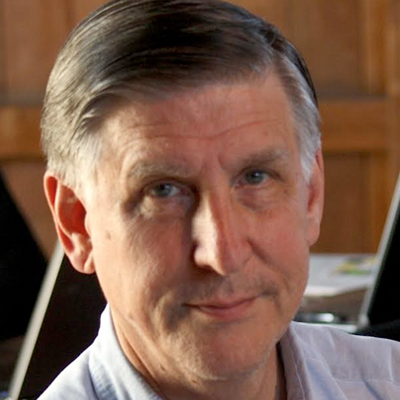Understanding human brain dynamics through enhanced analysis of brain electrical activity
Understanding more about the human brain can uncover more effective methods for health care, learning, and communication. Of the current brain imaging modalities, only non-invasive brain electrical recording (electroencephalography or EEG) can follow brain activity at the full speed of thought and action itself. Using affordable and lightweight equipment, EEG recording can be used to uncover ways in which our brains support our thinking, feeling, acting, and interacting, and can identify pathologic brain activities that underlie brain disease and disabilities. Dr. Scott Makeig, Research Scientist and Director of the Swartz Center for Computational Neuroscience at the University of California, San Diego, develops high-resolution EEG brain imaging combined, for the first time, with simultaneous high-bandwidth recording of eye and body movements. This new Mobile Brain/Body Imaging (MoBI) can breathe new life into fields of psychiatry and neurology, while also allowing new, more effective human-computer interface designs for workplace, school, and home use. In particular, Dr. Makeig is now using these techniques to explore how the brain supports our experience, learning, and performance of music.
At the University of California, San Diego’s Swartz Center, Dr. Makeig and his team develop new models of human electrical brain activity, build and distribute open source software to allow others to extract more useful information from their human EEG and related data, and work with clinical researchers to glean more meaningful information from the data they collect in studies of ADHD, schizophrenia, Parkinson’s, epilepsy, glaucoma, traumatic brain injury, and other conditions. Others at the Swartz Center are developing applications for new mobile, wearable EEGs and other sensing modalities. The team releases their advances in analysis methods in the form of open source software for the EEGLAB software environment they develop and maintain -- now the most widely used by cognitive neuroscientists worldwide.
Most recently, with senior colleagues at several UC campuses, Dr. Makeig created UC MERCI, the ‘UC Music Experience Research Community Initiative' that has been given preliminary funding and a UC Research Catalyst award by UC President Janet Napolitano, one of five such awards from the nearly 200 proposals submitted for consideration. Through the MERCI initiative Dr. Makeig and colleagues will use all scientific methods to address how music is experienced and how it so powerfully communicates thoughts and feelings. In its first phase, UC MERCI will organize workshops, webcast seminars, a UC music science web portal, and will test an innovative program in which research students will travel between campuses performing music-related experiments using multiple data modalities, drawing on the diverse expertise of interested faculty across the UC system.
Dr. Makeig’s current research areas include:
-
Developing new methods and open source software for measuring and interpreting human brain activity: All signal processing methods have, at their base, a conceptual model of the process being modeled. Brain processes that organize our experience and behavior are not yet well understood, making it difficult to develop algorithms to measure and visualize them. Making progress in this field is a long process, integrating latest discoveries in both brain biology and mathematics while constantly refining hypotheses against new and existing data. When their value is proven, the new analysis approaches are converted into open source software that must be made robust and easy to use by a wide range of researchers. By incorporating the resulting software into the open source EEGLAB software environment, Dr. Makeig’s lab helps researchers everywhere better analyze data from their own experiments. In 2015, Dr. Makeig and his team at the Center will present their 19th and 20th non-profit EEGLAB workshops in France and England to 40~120 students from many countries in attendence. Some will go on to expand those tools by releasing their own extensions. Dr. Makeig also provides a website and an online workshop site he hopes to expand into a more complete video-based course in EEG source imaging.
-
Applying these methods to interpret new and existing clinical brain research data: Working with a number of clinical researchers in several areas, including ADHD, glaucoma, schizophrenia, Parkinson's, and epilepsies, Dr. Makeig works to address basic challenges in many fields of clinical research. Identifying the effective brain sources of the recorded electrophysiological data and better modeling their activities make the research more productive and valuable.
-
Developing high-resolution imaging of the brain dynamics that support our behavior and social interactions: Through the long history of psychophysiology, the study of the biology underlying our experience and behavior, the amount of information about brain activity delivered by modern systems has steadily increased. However, the amount of behavioral data collected has remained extremely limited. Dr. Makeig has introduced a new approach, Mobile Brain/Body Imaging (MoBI), an original concept that is a natural successor to traditional brain imaging paradigms in which subjects are asked to lie or sit completely still while responding to a series of presented items using only tiny finger button movements. Through this work with MoBI, Dr. Makeig and team are developing a science of the human brain dynamics that support our more natural cognition, by asking participants to exhibit naturally motivated behaviors, including in some cases social interactions, while their brain activity, respiration, heart rhythms, and body and eye movements are recorded. Dr. Makeig’s team is developing methods to analyze the joint data to learn how the brain supports both what we do and what we experience. MoBI is in effect a quite new imaging modality that is shifting paradigms, the first brain imaging modality that allows recording of natural actions and social interactions in natural human environments.
-
Understanding how the brains support our feelings and aesthetic experiences including musical experience: After nearly 30 years of research to develop and apply advanced analysis methods to human EEG and related electrophysiological data, Dr. Makeig now seeks to work with talented students and junior researchers to study the human brain dynamics that support musical experience and communication using the high-resolution EEG source imaging and MoBI research methods he and his colleagues have developed. Research on human aesthetic experience, including musical experience and communication, can both inform a deeper understanding of human nature, and can suggest new methods for training, selection, experience, performance, and creation of meaningful music and art. He proposes research focused on empathy -- by studying brain/body dynamics during meaningful conversations between pairs of participants training in empathic listening and communication. Traditional research funding is strongly limited in areas relating to experience and communication of feelings. Philanthropy in this area can make possible research with large potential payoffs for both medicine and society.
Bio
Dr. Scott Makeig’s early interests were in music (piano and composition) and mathematics. Near the end of his undergraduate years he awoke an interest in psychology. Embarking on graduate studies, he set himself to learning more about the experience of music, first via a preparatory Master's degree in Music Theory and then at University of California, San Diego in a Ph.D. program entitled, "Experimental Music Theory." It had already become clear to him that musicology then focused only on relationships between notes on the printed score, not on the experience of music itself or what it communicated to the listener. Exploring graduate courses across the University of California, San Diego campus, all of which might now be housed in a division of Cognitive Neuroscience, he was introduced to his scientific mentor, Robert Galambos, an experimental neurophysiologist and UCSD Neurosciences founder who was then working with human electrical brain activity and needed a final laboratory assistant. There he was able to put his background knowledge of programming and signal processing to use, leading to a Ph.D. in 'Music Psychobiology' -- perhaps the first on this topic. Dr. Makeig has always tried to remain free of established conceptions that hold can back scientific progress, keeping in mind advice he heard early on to “think deeply about simple things” in whatever he studies.
Outside of his lab, Dr. Makeig maintains an active interest in music, playing the piano, currently attempting to learn to play Bach on the violin, and again composing for UC MERCI events.
For more information, visit Dr. Makeig’s home page.
In the News
Mar. 10, 2010
Dec. 10, 2014


